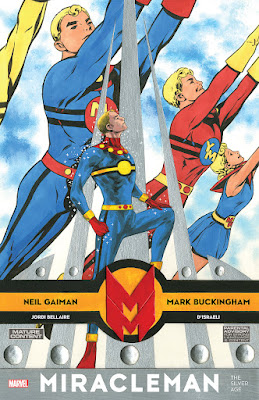Miracleman: The Silver Age
 |
|
Collection published: 2024 Contents originally published: 1990-2024 Acquired: May 2024 Read: August 2024 |
This volume finally extends and continues the story of Miracleman from where Neil Gaiman and Mark Buckinham left off in the early 1990s; my understanding is that it contains a few issues they completed then (though with alterations to the art and coloring) and a few issues only published in the 2020s (mostly or entirely written in the 1990s, I think, but not illustrated until the 2020s). Even though Marvel began reprinting Miracleman back in 2014, it was only this year that they finally wrapped up Gaiman and Buckingham's second volume in single-issue format and thus finally released a collection—its release finally being my impetus to sit down and read all the Miracleman comics I'd been picking up.
While book one of the Gaiman/Buckingham run gave us a series of one-off snapshots of Miracleman's utopia, this volume consists of one continuous story. Or rather, half a story, as it ends with a declaration that the story is "TO BE CONTINUED IN THE DARK AGE." But given it took us ten years to get The Silver Age, which had largely already been written, I'm not optimistic that we'll get The Dark Age anytime soon. Maybe in the 2050s?
Anyway, as part of his project to bring the dead back to life, Miracleman revives Young Miracleman, who died before the events of Alan Moore's first book. Richard "Dicky" Dauntless is thus thrust from the world of the ordinary(-ish) 1950s straight into Miracleman's utopian 2003. The book covers his difficulty adjusting to this new time and place, as well as to his discoveries about his own history. How does someone with 1950s attitude toward gender, sexuality, and other social constructs fit into a benevolent libertarian dictatorship?
The story moves slowly but strongly, especially thanks to the work of the always dependable Mark Buckingham. While The Golden Age saw him working in a number of styles, this volume keeps him what I think of as his "default" style (as seen in works such as Dead Boy Detectives); he's good at capturing emotion and character, which works well for the highly contemplative tone of this volume. The best material, in my opinion, was Richard's trip to the mountains, where he seeks out a man who was given powers by Miracleman but voluntarily gave them up, and this causes him (as well as his traveling companions) to think about his place in this new world.
Moore's original run hinted that Young Miracleman was gay; Gaiman picks up on that here, but in a way that made me a bit uncomfortable with its implications. I'm curious to see where this goes in The Dark Age, however.
Overall, I found this interesting but unfinished. It very much depends on The Dark Age. It seems like it could have some interesting things to say, but it also seems like it might end up being a reactionary take on utopias, undermining what made Olympus and The Golden Age so interesting. Hopefully we find out before the 2050s.
Also, I have to complain that while the first four Miracleman volumes were originally released in hardcover, this one only came out in trade paperback. C'mon Marvel, what the hell is this? Your target audience for releases of long-lost 1990s comic books is also the exact kind of people who want their collected editions to go together and will pay for a hardcover! The release strategy of this whole series has left a lot to be desired... I fervently hope they don't end up doing a hardcover later, though; I don't want to have to fight off the temptation to rebuy this.
No comments:
Post a Comment